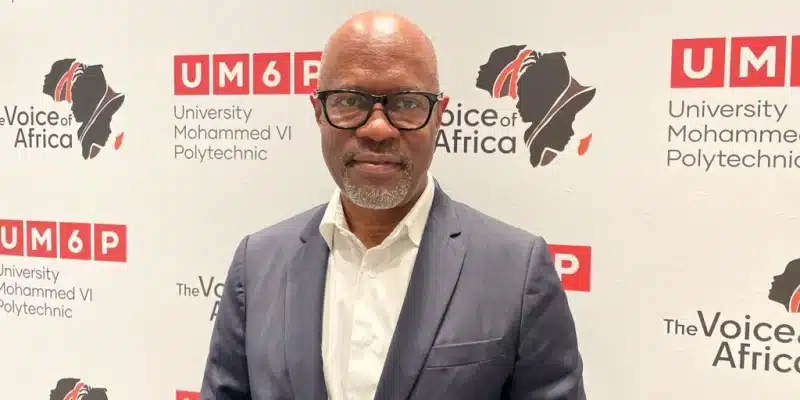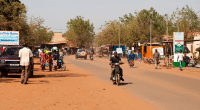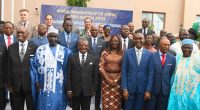Alpha Barry is one of the leading figures in the global economy attending the “Voice of Africa” organized by the Mohammed VI Polytechnic University (UM6P) on the sidelines of the Annual Meetings of the World Bank and the International Monetary Fund (IMF). In this interview conducted in Morocco, the Africa director of French technology firm Atos highlights blockchain, sustainable innovation and decarbonisation, which he sees as urgent for the updating of the Sustainable Development Goals (SDGs) on the African continent.
Alpha Barry is one of the leading figures in the global economy attending the “Voice of Africa” organized by the Mohammed VI Polytechnic University (UM6P) on the sidelines of the Annual Meetings of the World Bank and the International Monetary Fund (IMF). In this interview conducted in Morocco, the Africa director of French technology firm Atos highlights blockchain, sustainable innovation and decarbonisation, which he sees as urgent for the updating of the Sustainable Development Goals (SDGs) on the African continent.
Benoit-Ivan Wansi: What is the history of Atos since its creation in 1997, and its main areas of activity?
Alpha Barry: Atos employs 107,000 people worldwide. The group has been present in Africa for several years now and bought the French IT company Bull in 2014. This acquisition has encouraged synergies and a strengthening of activities in Africa, particularly French-speaking Africa, including Morocco. We offer several solutions to our customers in terms of infrastructure (computer and storage equipment), but also systems integration services including the implementation of Applications to modernise the management of public and private organisations. We support companies in digitising their internal management processes as well as their customer relations activities. Atos’ overall turnover is €11 billion, with Africa accounting for around 1% of the Group’s total, and growing.
What do you think is special about digital technology today, and who are you working with on the African continent?
There are several – among them I would mention blockchain. Many applications are possible today thanks to blockchain, which facilitates the monitoring and traceability of transactions between farmers and their customers, for example. For example, it can be used to increase and secure the income of small-scale farmers. Our ambition is to work in partnership with local start-ups on specific issues related to sustainable development (food security, climate change, transport).
What is your vision of the smart city, where digital technology can improve the quality of life for people in Africa?
We have a whole team dedicated to smart cities. We have developed solutions that enable us to collect and record information on transport and air quality in a megabase of data so that, using artificial intelligence (AI) tools, we can remedy over-consumption of energy, for example. By way of illustration, Atos is present in Egypt, particularly in the capital Cairo, which has a high level of air pollution. Our teams are currently carrying out studies aimed at refining the Group’s offer in decarbonisation solutions. This should make a significant contribution to the ‘net zero’ in the fight against global warming.
Is the environmental impact of digital technology significant enough, and how can you succeed in decarbonising your activities on the continent?
There is a real environmental impact from digital, with data centres in particular being significant consumers of energy. Atos has set a target of carbon neutrality for its digital activities by 2035. To this end, Atos is introducing energy-saving measures for the various components of the equipment it manufactures, right from the design cycle of its servers and supercomputers. Atos also has a specific offering to help companies and organisations migrate their applications and data to the cloud, which has the advantage of reducing the number of data centres by centralising them more economically and potentially using less energy, while respecting national sovereignty.
Of all the countries you have visited, which is investing and innovating the most in terms of ecological transition?
I often read that Rwanda is a model in Africa in terms of innovation and ecological transition. But personally, I haven’t really seen any countries that are committed to environmental concerns or that have placed particular emphasis on reducing their carbon footprint. Most countries are seeking to develop industries based on fossil fuels, to continue extracting oil and gas, for example.
The paradox is that Africa is the continent that emits the least carbon on the planet, but suffers the most negative consequences. This is why our governments now understand the urgency of climate change, given the disastrous effects of prolonged floods and droughts. There is Ethiopia, for example, where food insecurity is rife, and Lake Chad, which now has a surface area of 2,000 km2, 90% less than in the 1970s (when it was ranked as the sixth largest body of fresh water in the world at 2,500 km2, editor’s note).
Read also-AFRICA: Google to launch a centre for climate-smart agriculture
Does Atos see itself as a competitor or as complementary to technology giants such as China’s Huawei?
I would say that we are complementary in that Atos specialises in solutions, not in building network infrastructures, as Huawei does with hardware. It’s like building a house, for example, where some companies take care of the foundations and building the walls and roofs, while others offer solutions to make the house useful, such as solutions for cooking, sleeping and other essential needs to make the house habitable and comfortable.
Interview by Benoit-Ivan Wansi, on special assignment in Morocco







